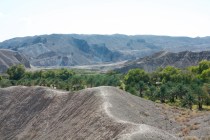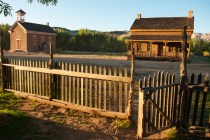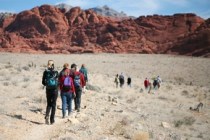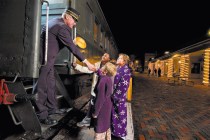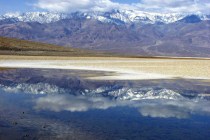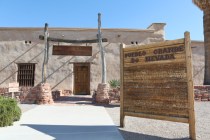Hit the road in Arizona to get your kicks on Route 66
Taking the road less traveled appeals to many Americans. Our Interstate highway system speeds traffic along, but often sacrifices uniquely American character and quirkiness for function and uniformity. A part of the American traveling public stubbornly insists on exploring America's side roads, such as the increasingly popular journey along portions of Old Route 66.
U.S. 66, known variously as "The Mother Road", the "Will Rogers Highway" and "The Main Street of America," connected the Midwest and the Pacific Coast for six decades. A vital link in the developing National Highway System, U.S. 66 ran nearly 2,500 miles from Chicago to Santa Monica, Calif. The road became the stuff of legends, songs, novels, movies and a popular television series.
When the expanding nation outgrew the old road system, the Interstate Highway System was conceived. By the 1980s, superhighways supplanted many former transcontinental routes such as U.S. 66. They became alternate routes or were entirely abandoned. Bypassed, many businesses and communities dwindled.
Alarmed at the demise of the famous highway, concerned groups in many states traversed by Route 66 urged efforts to preserve U.S. 66 as a historic route. In neighboring Arizona, the Route 66 Association formed in 1987, pressing the state for a special designation of "Historic Route 66," accomplished that year.
Today, the longest intact remnant of Route 66 runs 140 miles through Arizona from Seligman to the Colorado River near Needles, Calif. The Route 66 Association touts the advantages of taking the old route, encouraging the use of the historic road as a memorable trip into yesteryear. It has become a road trip of choice for roadies of all stripes, such as motorcyclists, sports car drivers and vintage car buffs.
To start the cruise along Historic Route 66 in Arizona at its northern end, Southern Nevadans travel about 200 miles to reach Seligman. Follow U.S. 93 across the Colorado River into Arizona, picking up Interstate 40 at Kingman and heading east. Exiting at Seligman, travelers find an active railroading town that boasts popular cafes, bars and shops connected with "The Mother Road."
From Seligman, Historic Route 66 heads back toward Kingman through ranch country, desert arroyos and wooded passes. Many travelers plan for a couple of hours spent touring Grand Canyon Caverns just off the highway 34 miles west of Seligman. Open daily except Christmas Day, the privately owned attraction offers visitors 45-minute tours of caverns reached by a 21-story elevator.
Historic Route 66 continues to Peach Springs, headquarters of the Hualapai Nation. The Hualapais own a 60-room resort with a cafe that accommodates many who take day-long white-water raft tours of a spectacular 65-mile section of Grand Canyon. The tribal group continues to develop tourist attractions at the Grand Canyon's West Rim, including its famous Sky Walk.
When Historic Route 66 reaches Kingman, plan to spend some time. The old railroad town offers a nostalgic downtown and a couple of nice museums. Be sure to stop at the old Powerhouse, which features Route 66 souvenirs and information and a museum showcasing the history of the highway. Displays and a short film trace the route's significance, including its part in the exodus of ruined farm families from the drought-stricken Midwest to California during the Great Depression following the financial crash of 1929.
Route 66 heads south from Kingman a couple of miles before crossing under I-40 and heading west to climb steadily toward precipitous Sitgreaves Pass. One of the most scenic and challenging parts of Old U.S. 66, the pass was a trucker's nightmare when the road was a major truck route. Just over the summit, the road passes through old Goldroad, where gold is being mined again. The route soon reaches historic Oatman, a very lively ghost town. Crowds flock there to watch gunfights, feed burros, browse through shops, dine, drink and visit the past in the museum upstairs in the 1921 Oatman Hotel.
South of Oatman, the route drops down to the Colorado River where it meets I-40 and crosses into California. Use I-40 to reach U.S. 95 to Las Vegas.
Margo Bartlett Pesek's column appears on Sundays.








